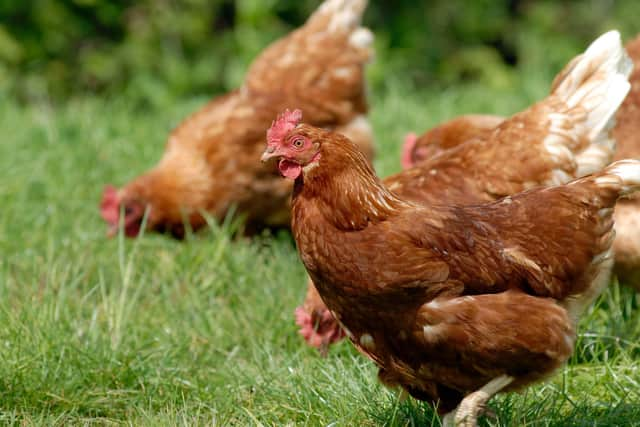Yorkshire egg producer says shop shelves will remain empty until someone "gets a grip" of pricing crisis
It comes as supermarket shelves have been empty of eggs for weeks as high input prices and low payments are forcing farmers to cease production and leave multi-million pound set ups empty.
Big supermarket brands such as Tesco, Asda, Sainsbury’s and Aldi have placed limits on how many boxes of eggs customers can buy with Sainsbury’s even resorting to stock Italian barn eggs due to UK shortages.
Advertisement
Hide AdAdvertisement
Hide AdGiles Field, director at York based Field Farm Eggs Co, said the push to free-range eggs was actually part of the problem as the set up costs are at least £50 per bird. If you have 30,000 hens that is around £1.5m and then a further £200,000 needed for the chicken.


Colony birds are cheaper to operate and you can have more and less space, he added, but these units are sat empty because of the demand for free range eggs and is part of the picture that has led to under production.
Last year, there were 42 million hens in the UK and now there are around 37 million so less eggs are being produced.
However, bird flu and input costs such as bird feed and electricity have rocketed but payments back to the farmer have not risen in line.
Advertisement
Hide AdAdvertisement
Hide AdMr Field said: “At the end of the day, unless you are at the top of the tree or supermarkets pay more, you will not see any more eggs. Simple. People don’t want to produce and make a loss or no money."
He says one farmer has paid for a 60,000 bird free-range unit but is cheaper to pay the bank loan interest and leave the unit empty than it would be to have producing chickens in it and make a loss from the business.
“You sometimes think the situation is exaggerated until you start speaking to people. It has always been a volatile industry but this is the most extreme I have ever seen.
"I lived through the salmonella scare and saw people go bankrupt, in between that we have had five or six market crashes where we have produced eggs but not made anything but farmers leaving buildings empty – I have never seen that.”
Advertisement
Hide AdAdvertisement
Hide AdEarlier this week, the NFU called for an urgent investigation by Defra into whether an “exceptional market conditions” declaration should be made under the Agriculture Act 2020, given the severe disruption egg producers and consumers are experiencing. A declaration under section 20 of the Act would enable Defra to use statutory powers to provide support to egg producers whose livelihoods are under threat.
Mr Field welcomed the intervention and said: “It is great the NFU has done that. Someone, somewhere needed to get a grip and get better prices so farmers can make money.”
The NFU said while bird flu, energy price inflation and supply chain disruption are factors, they are not the only reason for empty shelves.
President Minette Batters added: “The NFU raised concerns about the functionality of the supply chain with Defra a number of months ago in the hope of avoiding the situation we have now, with some retailers having to limit UK consumers’ access to eggs. This is surely a prima facie case of severe disturbance to an agricultural market.”
